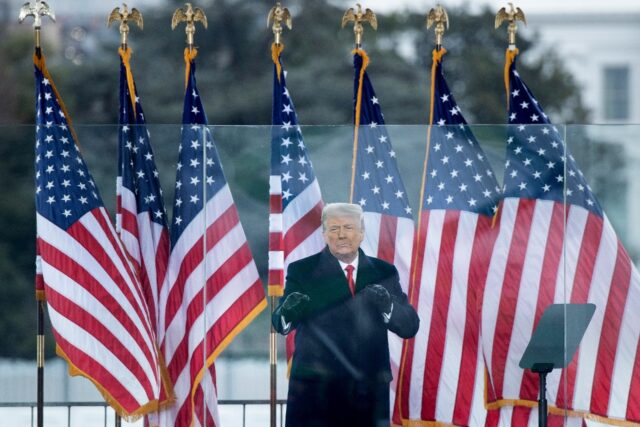A court ruling that effectively labels the January 6, 2021 attack on the US Capitol as an anti-government rebellion raises the possibility that ex-president Donald Trump could himself be charged with sedition.
The jury conviction Tuesday of two militia leaders on charges of seditious conspiracy raised the stakes for Trump, who is under investigation over his role in fomenting the Capitol assault, which was aimed at keeping him in power after his election loss.
A House of Representatives committee and a Justice Department special counsel are separately examining Trump’s role in January 6.
The committee’s report is expected within weeks, and it could issue referrals for prosecution to the Justice Department.
In June Liz Cheney, the committee’s Republican vice chair, said they were probing Trump for his role in “plots to commit seditious conspiracy.”
Last week committee member Jamie Raskin told The Harvard Gazette that there is “undoubtedly” probable cause to believe Trump committed crimes.
The January 6 attack “flowed out of his determination to overthrow the election by any means necessary including — ultimately — coordinating a violent insurrection,” Raskin said.
– Rare charge –
The two Oath Keepers convicted of sedition — group founder Stewart Rhodes and Florida chapter head Kelly Meggs — were the first of nearly 900 people arrested over the January 6 events to be tried on the charge of seditious conspiracy.
Rarely used by prosecutors because it is politically explosive, the charge carries a prison sentence up to 20 years.
Four more Oath Keepers, and separately, members of a similar far-right group, the Proud Boys, will soon face trials on the same charge.
“Now that we have seen that juries accept this theory of seditious conspiracy, the likelihood of conviction for others has gone up,” Barb McQuade, a University of Michigan law professor and former federal prosecutor, told AFP.
McQuade said the verdict gives the Department of Justice leverage with those facing similar charges to negotiate guilty pleas and cooperate against other January 6 suspects.
“To reach Trump’s inner circle, talking with those who planned the attack on the Capitol would be a great value to DOJ to help them determine whether the planning went as high as Trump or his allies,” she said.
Political case
But it is not clear whether the Oath Keepers verdict will embolden prosecutors to go that far.
The case is unavoidably enmeshed in politics, especially after Trump announced recently that he would seek reelection in 2024.
After that, Attorney General Merrick Garland — an appointee of Trump’s rival, President Joe Biden — named an independent special counsel, Jack Smith, to handle probes against Trump.
What is more, the Oath Keepers trial did not establish any clear link between the defendants’ actions and Trump, and three of the group’s members were acquitted of seditious conspiracy, although they were found guilty of other charges.
Asha Rangappa, an attorney and former FBI agent, said that means the Justice Department needs much stronger evidence to go after the ex-president.
“The legal bar… is very high” for Smith to charge Trump, she said.
Garland himself has avoided direct comment on the Trump probe.
But he stressed in a statement after the Oath Keepers verdict that the department “is committed to holding accountable those criminally responsible for the assault on our democracy on January 6, 2021.”
Public perception
Raskin said the clearest potential charge against Trump is conspiracy to interfere with a federal proceeding, as the then president openly encouraged his followers to march on the Capitol and disrupt the session, which was being led by then-vice president Mike Pence.
“That crime seems tailor-made for precisely what Donald Trump did,” Raskin told The Harvard Gazette.
But some attorneys say stopping at the charge of disrupting Congress would downplay the seriousness of what happened on January 6.
“Interfering with an official proceeding, therefore, could be only a small piece of what was wrong with Trump’s conduct that day,” former prosecutors Claire Finkelstein and Richard Painter wrote in The Washington Post in August.
What Trump advocated, they said, was no different from what the Oath Keepers were accused of — seditious conspiracy and insurrection.
“It is critical for public perception, for history… that if he is charged, it is first and foremost with the crimes that best reflect the gravity of the danger he posed to the country,” they said.

COMMENTS
Please let us know if you're having issues with commenting.